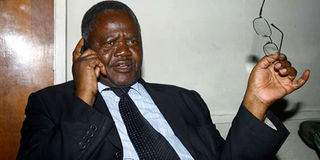Lecturer Chris Wanjala's death marks end of a chapter

The late Prof Chris Wanjala. His autobiography, Africa's Bearded Men, had not been published by the time of his death. PHOTO | FILE | NATION MEDIA GROUP
What you need to know:
- Wanjala became a member of Youth For Kanu 92, an outfit put together to campaign for the re-election of President Daniel arap Moi.
- Wanjala wrote a novel, Drums of Death, but it was not as accomplished as his critical works.
Prof Chris Wanjala came into his prime when literary critics were as combative as they were prolific.
In the 1970s and 1980s, his contemporaries like Es'kia Mphalele, Lewis Nkosi, Abiola Irele and Peter Nazareth took on creative writers in debates about how to construct, reconstruct and deconstruct politics and society.
Prof Wanjala took on David Maillu, then well-known for his titillating novels like The Flesh, My Dear Bottle, After 4.30 and Unfit for Human Consumption.
He questioned whether such works, which constituted what is known as popular literature, should be regarded as literature.
In his view, and in the view of many prominent critics of his time, literature was meant to put itself at the service of society and to fight alongside those seeking liberation either from occupying forces or repressive post-independence regimes.
It must be remembered that this debate had at its canvass the struggle against apartheid in South Africa and colonialism in countries like Zimbabwe, then known as Southern Rhodesia, before it gained independence in 1980.
PURPOSE
Critics like Prof Wanjala and writers like Ngugi wa Thiong'o, Alex La Guma and others who believed literature could not be divorced from politics, argued that literature had to be "committed" to an edifying social or political cause.
In their view, art could not just exist to be enjoyed.
Any such work, which they called "art for art's sake", had no place in post-colonial Africa where literature could be used to chastise errant leaders, amplify the calls of freedom and give a voice to the downtrodden majority.
Though the writers and critics engaged in heated debates in newspapers and journals, they also wrote books of far-reaching import.
For Prof Wanjala, the seminal works remain For Home and Freedom and A Season of Harvest, in which he expounded on theories.
These books also shaped writers in subsequent generations by arguing, for instance, that for writers to be successful, they had to mix their urban and rural sensibilities in their works.
YK92
Despite this fiery phase of his life, Prof Wanjala would — like Cyrus Jirongo and William Ruto — become a member of Youth For Kanu 92, an outfit put together to campaign for the re-election of President Daniel arap Moi in the first multiparty election after the repeal of Section 2A of the Constitution in 1991.
This was probably the professor's lowest moment as a public intellectual, although another academic, William Ochieng, achieved greater notoriety for his defence of the Kanu regime.
As chairman of the Literature Department at Egerton University, Prof Wanjala was a towering intellectual, helping to organise at one time the popular annual gathering of social scientists and creatives at the institution.
This idea was later energised by Kenyatta University during the tenure of Prof George Eshiwani and came to be known as KU Cultural Week.
As a lecturer, Prof Wanjala did not seek to impose his knowledge on his students.
Rather, he encouraged them to speak up and was more keen to hear them than to talk to them.
LECTURES
It is only much later when people like myself read Paulo Frier's The Pedagogy of the Oppressed that we learnt that this teaching method was most empowering.
But when we were learning at his feet, awed by his presence, we often wondered why he was not feeding us with all the knowledge he had.
Prof Wanjala wrote a novel, Drums of Death, but it was not as accomplished as his critical works.
However, the young generation of Kenyans will remember him for Memories We Lost and Other Stories, an anthology of short stories he edited and which was produced by Moran Publishers.
It was approved by the Kenya Institute of Curriculum Development as a set book for the Kenya Certificate of Secondary Education (KCSE) examination.
His autobiography, Africa's Bearded Men, had not been published by the time of his passing yesterday.





